 Petzlover
PetzloverPersian is originated from Iran but Red Point Siamese is originated from United Kingdom. Both Persian and Red Point Siamese are having almost same weight. Persian may live 8 years less than Red Point Siamese. Both Persian and Red Point Siamese has same litter size. Persian requires Moderate Maintenance. But Red Point Siamese requires Low Maintenance
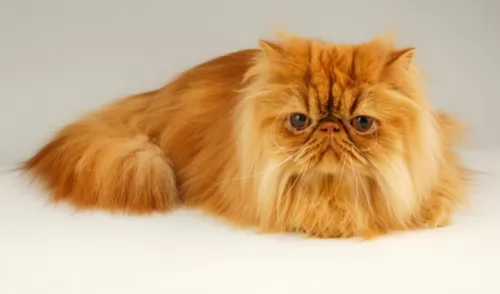 Cat lovers the world over know the Persian cat very well. It's a beautiful long-haired cat breed with its familiar round face and blunt muzzle.
Cat lovers the world over know the Persian cat very well. It's a beautiful long-haired cat breed with its familiar round face and blunt muzzle.
It is not really known when long-haired cats first appeared, or where the Persian originated but their history stems from Persia or Iran as it is known today, where it seems they were first sighted.
The cats were grey-coated and some were white and soon the cats arrived in Britain. They were introduced to the United States in the 1900s. The cat was developed first by the English, and then also by American breeders after the Second World War and the breeding of these cats has also meant a lot of coat colors.
The Siamese cat remains one of the most famous among the cat breeds. The Red Point is also known as the Flame Point Siamese cat. This breed of Siamese is rare.
It is believed that when the seal point Siamese breed was first introduced to the U.K in the 1930s they were bred with cats that carried these orange genes such as the tabby or tortoiseshell British shorthair cats.
Breeders wanted to produce a Siamese-style pointed cat in colors other than the traditional shades,
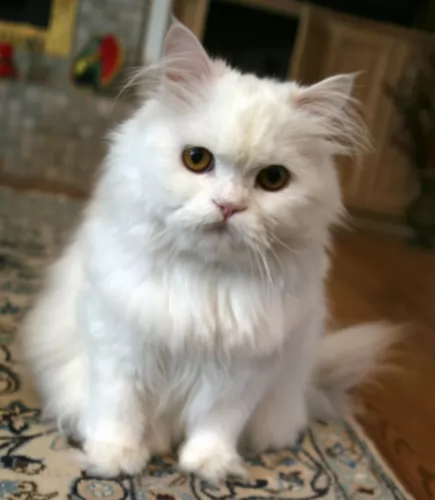 The Persian cat is a medium- to large-sized cat and is heavily boned. He can weigh between 3 and 6kg.
The Persian cat is a medium- to large-sized cat and is heavily boned. He can weigh between 3 and 6kg.
He has stocky legs, a thick neck, small ears, round head, round eyes, and the face is flat or blunt. The kittens are gorgeous balls of fluff.
The coat of the Persian is thick, long, and silky. People many times think only of a white Persian, when in fact the cat comes in many colors and patterns. Eye color for the cat can be blue, green, brown, copper or even odd-eyed.
The Persian isn’t the most active of cats, so attention will need to be given to exercising the cat so as to manage his weight. This cat will also need to have his nutrition controlled to stay in shape and in good health.
Persians enjoy games with their human family and will need some toys to encourage play and exercise.
He is placid and calm but that doesn’t mean he can’t have bursts of energy. They’re quieter than other cats, are sweet-natured, preferring to live in quieter, less boisterous households.
They aren’t loudly vocal but communicate with their eyes and their soft voices. They won’t get on well with small, noisy children but can be loving pets and companions of older children who allow them their own space.
These cats are medium-sized, muscular cats and can weigh between 3 and 6kg. The neck is fairly long, the legs long and lean too.
These attractive cats have got reddish-gold points and with their sparkling blue almond-shaped eyes they really are a beautiful breed of cat. Like other Siamese kittens, the Redpoint kittens are also white when they are born. Variations of the Red Point Siamese cat should always have creamy-white bodies with the reddish-orange points.
The coat is short, thick, and silky. The points start emerging later on and deepen as the cat matures. You may see reddish freckling over the face, legs and paws as well as the tail.
The Redpoint Siamese is playful, social, friendly and intelligent. They love nothing more than to be around their human family but don’t warm too well to strangers.
They tend to become possessive over what they feel is theirs. They are also very vocal and have a different meow to express their feelings. These are definitely cats that don’t like being left alone for long periods of time. They want to be occupied and entertained and will need lots of stimulating toys to keep them occupied and exercised.
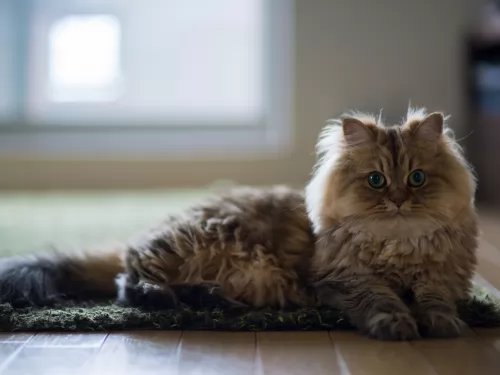 The amicable personality of the Persian cat makes it easy to have these cats in your home. The long hair becomes a bit of an issue as the cat sheds quite a bit.
The amicable personality of the Persian cat makes it easy to have these cats in your home. The long hair becomes a bit of an issue as the cat sheds quite a bit.
They’re sweet, quiet cats and they don’t demand attention from you. They are more than happy just lying quietly in a warm spot. They are calm, loving cats and it's no wonder that they are still such a popular breed of cat.
If you’re looking for an exceptionally affectionate cat, then the Red Point Siamese is full of personality and will suit you very well as these cats are remarkably affectionate.
They always take an interest in what their humans are getting up to. They’re capable of forming strong bonds with their human family. They are also curious and intelligent and they can be taught a few tricks too.
They’re good-natured with their own human family but are not friendly with strangers.
They’re also energetic and agile and love to leap up onto a perch or your shoulders and survey his world from there.
If you want a cat that is an involved member of your family and an awesome companion, the Red Point Siamese will fit into this category superbly well.
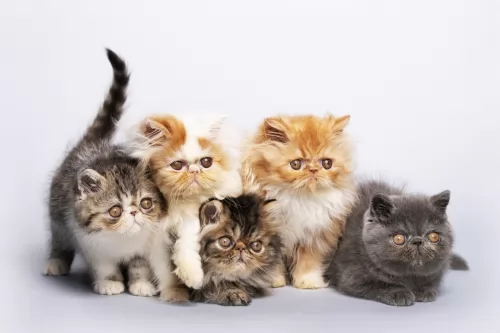 The structure of this cat’s head can mean some health problems. Hereditary Polycystic kidney disease is prevalent with the Persian cat. It is an inherited condition that causes cysts to form in the kidneys. These cysts are actually present from birth, growing larger over time and interfering with kidney function and ending in kidney failure.
The structure of this cat’s head can mean some health problems. Hereditary Polycystic kidney disease is prevalent with the Persian cat. It is an inherited condition that causes cysts to form in the kidneys. These cysts are actually present from birth, growing larger over time and interfering with kidney function and ending in kidney failure.
Also, with a larger breed cat such as the Persian, hip dysplasia is a problem.
Persians are also susceptible to malocclusion which means ‘incorrect bite’. This particular condition can affect the cat’s ability to grasp and actually hold food. So much so in fact, that now pet food manufacturing companies have even developed specially-shaped kibble to cater particularly for the Persian.
The Red Point Siamese isn’t going to have any more cat diseases than any other cat. Any cat stands a better chance at good health when they have an exceptionally healthy diet.
Have your cats neutered or spayed to prevent unwanted kittens and to promote better health for your cats.
Watch out for diseases such as Progressive retinal atrophy (PRA), a genetic eye problem where the cells deteriorate. The disease, though not painful, can lead to blindness.
Obesity in cats, but particularly a slim, athletic cat such as the Red Point Siamese, can bring on a host of health issues. Overfeeding your cat isn’t a form of love but an irresponsible act. There are just too many dangers linked to being overweight to ignore. Excess weight can lead to joint problems as well as diabetes, and just getting rid of a little bit of weight can already result in increased overall good health.
Cat experts tell us that excess weight can shorten your pet’s life by 2 years. Get some tips on feeding your cat and keep him playfully active as well.
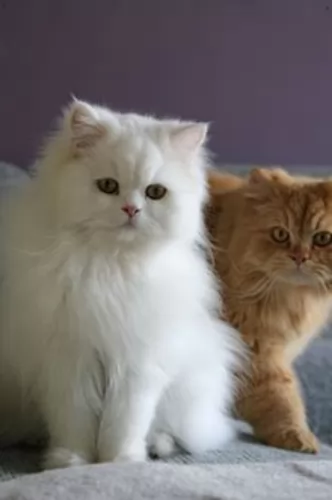 The Persian cat’s coat is long and silky and because he is a fairly heavy shedder, he will require regular brushing – certainly once or twice a week to get rid of that loose hair. It is important to brush and also cut the hair so as to get rid of the tangled knots that form.
The Persian cat’s coat is long and silky and because he is a fairly heavy shedder, he will require regular brushing – certainly once or twice a week to get rid of that loose hair. It is important to brush and also cut the hair so as to get rid of the tangled knots that form.
While brushing your Persian, make sure that his eyes and nose are clear. This is important because the flat face creates problems with these cats.
Excellent cat food for your Persian involves reading labels and understanding what brands are best for your beautiful cat. The Persian cat is a carnivore and will require high-quality food rich in protein.
Speak to your vet if you are in any doubt about the best food for your cat’s health and wellbeing. Make sure your pet has a constant supply of fresh, cool water.
Make sure to keep the litter box clean. Buy a small rake from the pet shop and rake up your cat's feces every single day and dispose of them.
With good care these cats cat reach 15 – 20 years of age.
The Red Point Siamese cat does shed but because it’s a low shedding cat, it becomes low maintenance. They usually shed in spring and again in the autumn. The short, easy-to-care-for coat can be brushed once a week.
Cats are strict carnivores, and just as a wild cat feeds on animal protein, so it is with a domesticated cat. They require a host of nutrients and only the best, high-quality foods contain these nutrients.
You get dry, semi-moist, and canned cat foods and the best commercial cat food manufacturers ensure that these foods have all the right balances of nutrients a cat needs.